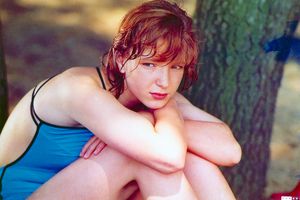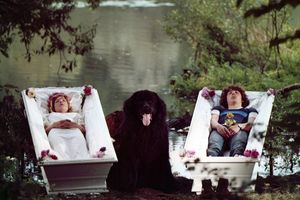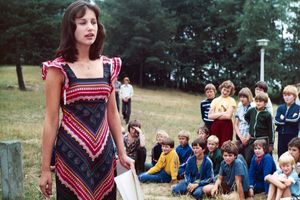Sieben Sommersprossen
Director: Herrmann Zschoche, 79 Min., Color, Feature Film
Deutsche Demokratische Republik (DDR)
DEFA-Studio für Spielfilme, 1977 - 1978
- Film/Video Format
- 35 mm
- Length in m
- 2164
- Other Title
- Sete sardas (Portugiesisch)
- English Title
- Seven Freckles
- Premiere Date
- Release Date (for Cinema)
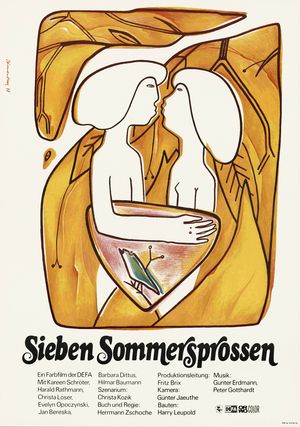
(Dir.: Herrmann Zschoche, 1977 - 1978) Graphic Design: Blumenthal
Short Summary (English)
Karoline and Robert, both very young and still at school, already knew each other as children as they lived in the same block of fiats. On their way to a holiday camp, they meet again. They fall in love, without, however, moving beyond raving and revelling in daydreams. Being together or alone is made more difficult by the orderly daily routine at the holiday camp. But also the other young people dislike the fact that Robi and Karoline are constantly together. So intrigues and petty jealousies come up easily. Some of the teachers also dislike the idea of such a young couple. When the student teacher, who is likewise deeply in love, suggests that the older groups should rehearse Shakespeare's "Romeo and Juliet" for the farewell party, the woman in charge greatly fears for the moral standards of the holiday camp.
Finally, the performance is put on. In a surprising way, it helps Robi and Karoline to deal with their problems by identifying with the characters of the play. So the staging is a great success, and the adults - including the camp leader - discover that fourteen-year-olds are no children any more.
Source: Progress Film-Verleih
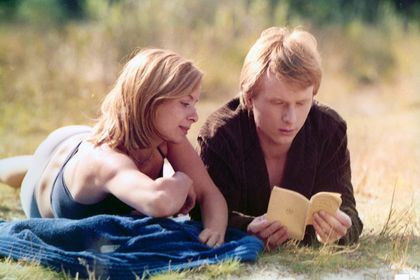
(Dir.: Herrmann Zschoche, 1977 - 1978) Photography: Herbert Kroiss
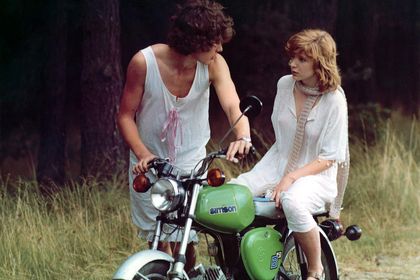
(Dir.: Herrmann Zschoche, 1977 - 1978) Photography: Herbert Kroiss
Film Crew
- Director
-
- Herrmann Zschoche
- Script
-
- Herrmann Zschoche
- Scenario
- Camera
-
- Günter Jaeuthe
- Film Editing
-
- Rita Hiller
- Cast
-
- Kareen Schröter (Karoline)
- Harald Rathmann (Robert)
- Christa Löser (Frau Kränkel)
- Evelyn Opoczynski (Bettina)
- Jan Bereska (Benedikt)
- Barbara Dittus (Karolines Mutter)
- Hilmar Baumann (Roberts Vater)
- Janine Beilfuß (Marlene)
- Carola Spindler (Doris)
- Sabine Schmich (Johanna)
- Michael Böttcher (Paulchen)
- René Rudolph (Micha)
- Carola Braunbock (Köchin)
- Hannes Stelzer (LPG-Vorsitzender)
- Annette Holzmann (Tina)
- Karsten Peter (Sven)
- Karsten Rintsch (Tom)
- James Schulz (Tinas Freund)
- Birgit Krüger (Große Schwester)
- Jeanette Rogge (Mädchen (Mädchengruppe))
- Steffi Kühnert (Mädchen (Mädchengruppe))
- Kerstin Ullrich (Mädchen (Mädchengruppe))
- Heide Großmann (Mädchen (Mädchengruppe))
- Annette Jüsche (Mädchen (Mädchengruppe))
- Petra Klämbt (Mädchen (Mädchengruppe))
- Frank Droste (Junge (Jungengruppe))
- Peer Krüger (Junge (Jungengruppe))
- Mario Eckardt (Junge (Jungengruppe))
- Andreas Steinke (Junge (Jungengruppe))
- Stefan Klar (Junge (Jungengruppe))
- Karsten Sinnak (Junge (Jungengruppe))
- Assistant Director
-
- Ursula Ullrich
- Assistant Camera
-
- Klaus Groch
- Production Design
-
- Harry Leupold
- Script Editing
-
- Gabriele Herzog
- Music
-
- Gunther Erdmann
- Peter Gotthardt
- Sound
-
- Christian Müller
- Werner Dibowski
- Costume Design
-
- Isolde Warscycek
- Make-Up
-
- Gerhard Petri
- Lothar Hiller
- Props
-
- Hans Kühnel
- Production Management
-
- Fritz Brix
- Unit Production Management
-
- Paul Lasinski
- Ursula Dombrowski
- DEFA Photography
-
- Herbert Kroiss
Awards
- Kritikerumfrage der Sektion Theorie und Kritik des Verbandes der Film- und Fernsehschaffenden der DDR 1979 (1979): Bester Gegenwartsfilm der DEFA des Jahres 1978
- I. Nationales Spielfilmfestival der DDR Karl-Marx-Stadt (1980): Spezialpreis der Jury - Herrmann Zschoche
- I. Nationales Spielfilmfestival der DDR Karl-Marx-Stadt (1980): Spezialpreis der Jury - Christa Kożik
- I. Nationales Spielfilmfestival der DDR Karl-Marx-Stadt (1980): Schauspielerpreis für Nebenrolle - Barbara Dittus
Short Summary (German)
Die 14-jährige Karoline und der 15-jährige Robbi, die früher mal im selben Haus gewohnt haben, treffen sich in einem Ferienlager wieder. Eine zarte Liebesbeziehung entwickelt sich zwischen beiden, doch der strenge Tagesablauf im Ferienlager setzt ihnen Grenzen. Sie suchen sich ihre Freiräume und stoßen damit auf Unverständnis wie Eifersucht. Der Gruppenleiter Benedikt, in seine Kollegin Bettina verliebt, hat Verständnis und schlägt den Jugendlichen vor, zur Abschlussfeier "Romeo und Julia" einzustudieren. Lagerleiterin Kränkel ist zwar strikt dagegen, kann sich aber nicht durchsetzen. Die Arbeit mit dem Stück führt bei Karoline und Robbi zum besseren Verständnis ihrer eigenen Situation und der Probleme, die sie in der Gemeinschaft haben. Ihre Liebe reift an dem klassischen Vorbild. Und bei der Aufführung ist sogar die Lagerleiterin zu Tränen gerührt.
(Quelle: Das zweite Leben der Filmstadt Babelsberg. DEFA-Spielfilme 1946-1992)
Short Summary (Other Languages)
Karoline e Robbi, due adolescenti che un tempo vivevano nello stesso condominio, si rincontrano a un campo scuola. Fra i due nasce un tenero amore, ma i ritmi serrati del campo alimentano la gelosia e le incomprensioni fra i due. Il capogruppo Benedikt, innamorato della sua collega Bettina, propone ai due ragazzi di interpretare per la festa di fine vacanza "Romeo e Giulietta". La signora Kränkel, direttrice del campo, è contraria, ma non può imporsi. Grazie all'interpretazione Karoline e Robbi capiscono meglio le rispettive situazioni e i problemi che hanno in comune. Il loro amore diventa più maturo e quando portano in scena lo spettacolo, anche la direttrice scoppia in lacrime. (Italienisch)
Karoline (14) et Robbi (15), qui habitaient dans la même maison, se retrouvent dans un camp d'été. Une tendre histoire d'amour se développe entre les deux, mais le quotidien réglé du camp leur assigne des limites strictes. Ils cherchent plus d'espace libre, mais se heurtent à l'incompréhension et à la jalousie. Le chef de groupe Benedikt, amoureux de sa collègue Bettina, comprend les deux jeunes et leur propose de répéter "Romeo et Juliette" pour la fête de clôture. Le travail sur la pièce aide Karoline et Robbi a mieux comprendre leur situation et les problèmes qu'ils peuvent avoir dans la communauté. Leur amour murit avec l'aide de ce modèle classique. Et lors de la Première, même la directrice du camp est émue au larme. (Französisch)
Os adolescentes Karoline e Robby se reencontram durante as férias de verão em uma colônia de férias. A vida da colônia obedece a uma organização rigorosa sob a vigilância de uma severa diretora que deixa pouco espaço para os reais interesses dos jovens: exercícios físicos matinais, participação na colheita, visitas a fábricas.. Entretanto, um dos monitores propõe outras atividades e estimula a encenação de Romeu e Julieta. Durante os ensaios de peça, Karoline e Robby se reaproximam e a encenação dentro da encenação, possibilita múltiplos entrelaçamentos e conflitos. No final, a estreia obtém um grande sucesso, chegando até mesmo a comover a durano diretora da colônia. (Portugiesisch: atrás do muro havia cinema: filmes da defa, alemanha oriental 1946-1992)

